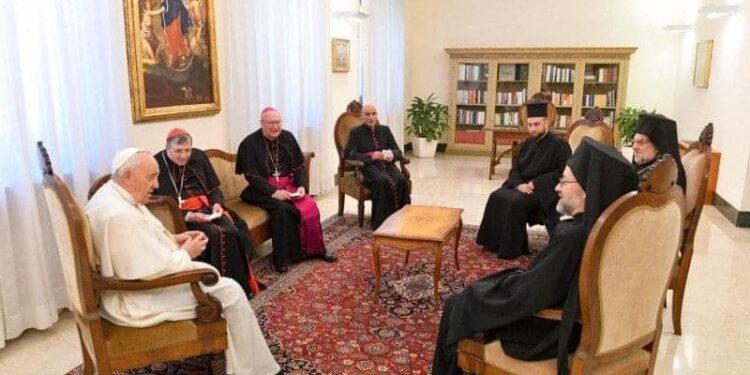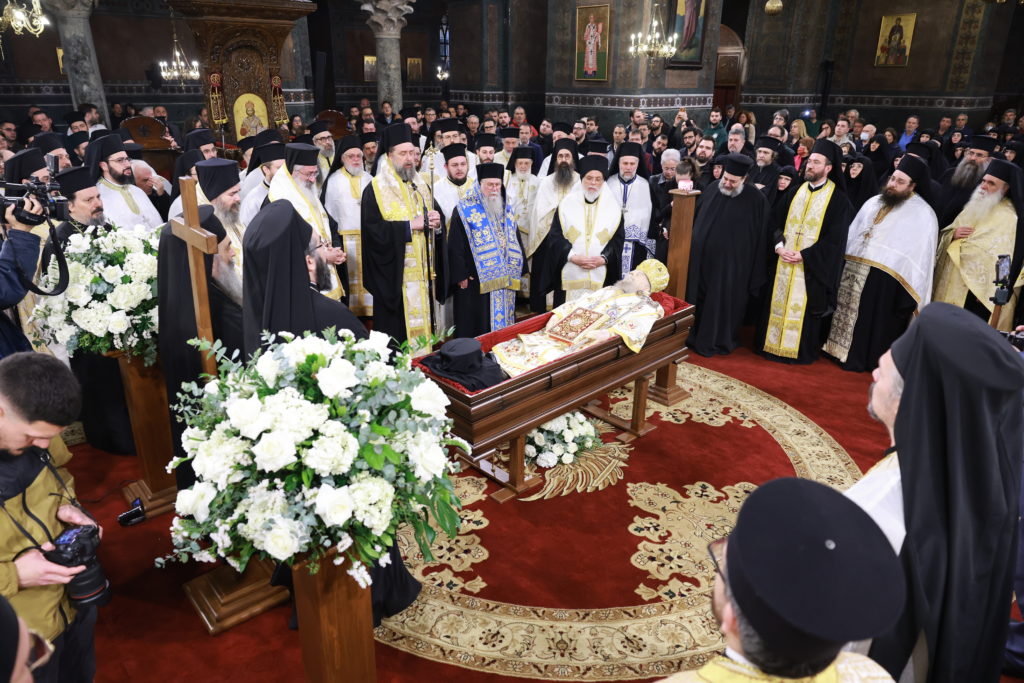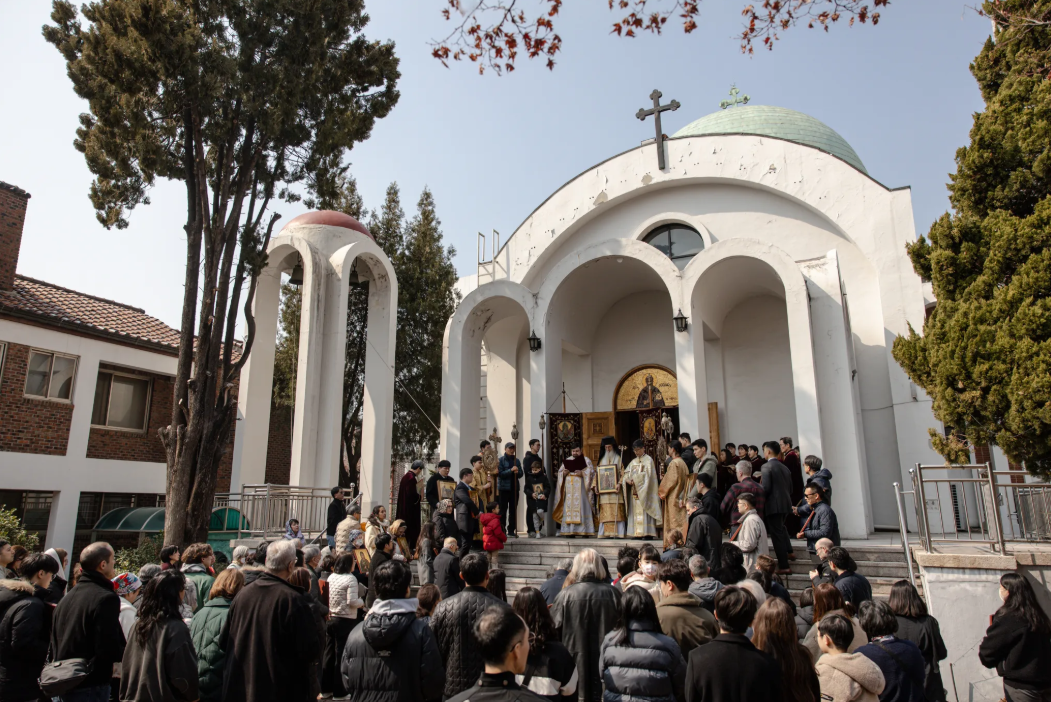Bartholomew to Pope: The Apostles Peter and Paul, continue to inspire our Churches

The Delegation of the Ecumenical Patriarchate, consisting of Archbishop Job of Telmessos, Co-President of the Joint International Commission for the Theological Dialogue between the two Sister Churches, Bishop Adrianos of Halicarnassus, and the Patriarchal Deacon Barnabas Grigoriadis, arrived in Rome on 28 June 2022 to participate in the Thronal Feast of the Church of Rome.
On 30 June, the delegation was received by Pope Francis in a private audience, in the presence of Kurt Koch, Prefect of the Dicastery for Promoting Christian Unity, Bishop Brian Farrell, Secretary of the Dicastery, and Monsignor Andrea Palmieri, Under-Secretary of the Dicastery.
In the audience, Archbishop Job of Telmessos read the following letter from the Ecumenical Patriarch Bartholomew, addressed to Pope Francis:
Your Holiness,
The Thronal Feast of the Church “which presides in love” fills our hearts with great joy year by year. Indeed, “a joyous feast has shone out today on the ends of the earth, the all-honored memorial of the wisest Apostles and their princes, Peter and Paul; and so Rome dances and rejoices,” and we, together with You, with one heart and one mind, “celebrate in songs and psalms this all-revered day” (Vespers of the Feast, aposticha).
For this reason, in continuation of the established tradition of exchanging delegations on the occasion of our respective Thronal Feasts, we convey our fraternal congratulatory wishes to Your Holiness through our Patriarchal Delegation, consisting of His Excellency Archbishop Job of Telmessos, Co-President of the Joint International Commission for the Theological Dialogue between our two Sister Churches, His Grace Bishop Adrianos of Halicarnassus and the Reverend Deacon Barnabas Grigoriadis, Secretary of this year’s venerable representation.
The two Holy Apostles, Peter, and Paul continue to inspire our Churches to witness the Gospel in the world in which we live, “for they shone more brightly than the sun in the firmament of the faith, and with the rays of the proclamation they brought the nations from ignorance to the knowledge of God.” For Peter “was nailed to a cross and so found the path to heaven,” while Paul “was beheaded by the sword and so departed to the Savior and is fittingly called blessed” (Vespers of the Feast). Thus, Peter who had wanted to deliver our Saviour from his arrest by taking his sword, received his teaching of non-violence, that “all they that take the sword shall perish with the sword” (Mt. 26:52), and put it into practice until dying on a cross, following the example of the Lord. Similarly, Paul, who once persecuted Christians, was converted on the road to Damascus by Christ who cried out to him: “Saul, Saul, why do you persecute me?” (Ac. 9:4). The two Apostles give us an example of conversion to the evangelical principle of non-violence decreed by our Saviour in the Gospel: “unto him, that smites you on the one cheek offer also the other” (Lk. 6:29), and which was even taken up in the last century by a great personality of humanity, the Indian politician and political ethicist Mahatma Gandhi.
The Holy and Great Council of the Orthodox Church convened in Crete in 2016 in its document entitled “The mission of the Orthodox Church in today’s world. The contribution of the Orthodox Church in realizing peace, justice, freedom, fraternity, and love between peoples, and in the removal of racial and other discriminations” states: “The Lord, as King of righteousness (Heb. 7:2-3) denounces violence and injustice (Ps. 10:5), while condemning the inhumane treatment of one’s neighbor (Mt. 25:41-46; Jn. 2:15-16)” (§ E.1). Furthermore, it adds: “The Church of Christ condemns war in general, recognizing it as the result of the presence of evil and sin in the world […] Every war threatens to destroy creation and life.” (§ C.4)
How precious the testimony of the two Apostles by the incarnation of the Gospel principle of non-violence is to us today, when the whole world suffers at this time from the political, economic, and ecological consequences of war at the door of Europe between two Christian peoples, resulting from the illegal invasion of Ukraine by the Russian Federation. The Churches cannot remain silent in the face of this tragedy of humanity. Called to be peacemakers, under no circumstances can they use religious language to justify or support aggression, violence, or war. On the contrary, they should support all initiatives and efforts to prevent conflicts through dialogue, which transforms all threats into opportunities and fosters peace, reconciliation, and solidarity. They are no losers in sincere dialogue.
From the experience of our mutual fraternal relations, we know how much meeting and dialogue are of capital importance in overcoming the unfortunate conflicts of the past. It is this sense, we are especially delighted with the positive results of the work of the Coordinating Committee of the Joint International Commission for Theological Dialogue between our two Churches, which during its last meeting in Rethymnon last May, completed the revision of the document on “Primacy and Synodality in the Second Millennium and Today”, which shall be submitted to the discussion and approval of the next plenary of the Commission planned next year in Alexandria. We pray for the successful meeting of the next plenary of the Commission and hope that this document will be helpful in elucidating our misunderstandings and shortcomings of the past, paving thus the way to restoring communion between our Sister Churches.
Your Holiness, dearest Brother Francis, celebrating today with you the Thronal Feast of the Church of Rome, we reiterate our deepest desire for the restoration of the communion between our Churches and pray our Merciful Lord, the Prince of Peace, to grant You health, strength, peace, and length of days to continue Your blessed ministry to the precious souls entrusted to Your Papal care and wisdom. Conveying to Your Holiness, the venerable Hierarchs, and the Christ-loving faithful of Your Church, our warmest greetings, we embrace you fraternally and remain with much honor and love in our Lord Jesus Christ, the Lamb was slain for the life of the world.
At the Ecumenical Patriarchate, on the twenty-ninth of June, 2022
Your Holiness’ beloved brother in Christ,
+ Bartholomew, Archbishop of Constantinople-New Rome and Ecumenical Patriarch
His Holiness Pope Francis responded with the following address:
Your Eminence, dear brothers!
I welcome you and I am grateful for your visit [and your kind words]. Yesterday you took part in the feast of the Holy Apostles Peter and Paul: your presence at the Eucharistic liturgy was a source of great joy for me and for all present, for it visibly manifested the closeness and fraternal charity of the Church of Constantinople towards the Church of Rome. I ask you to convey my greetings and my gratitude to my dear brother Bartholomew, Ecumenical Patriarch, and to the Holy Synod, who sent you to be here with us.
The traditional exchange of delegations between our Churches for the celebration of our respective patronal feasts is a tangible sign that the days of distance and indifference, when our divisions were considered irreparable, is long past. Today, thank God, in obedience to the will of our Lord Jesus Christ and with the guidance of the Holy Spirit, our Churches are engaged in a fraternal and fruitful dialogue and are committed in a convinced and irreversible way to advancing towards the restoration of full communion.
In this regard, I think with gratitude to those who initiated this process. In particular, I gladly recall, as the fiftieth anniversary of his death approaches, the unforgettable Ecumenical Patriarch Athenagoras, a wise and courageous pastor who continues to be a source of inspiration for me and for many others. It was he, who spoke of “Sister Churches, Brother Peoples”.
Sister Churches, Brother Peoples. Reconciliation among separated Christians, as a means of contributing to peace between peoples in conflict, is a most timely consideration these days, as our world is disrupted by a cruel and senseless war of aggression in which many, many Christians are fighting one another. Before the scandal of war, in the first place, our concern must not be for talking and discussing, but for weeping, for helping others and for experiencing conversion ourselves. We need to weep for the victims and the overwhelming bloodshed, the deaths of so many innocent people, the trauma inflicted on families, cities and an entire people. How much suffering has been endured by those who have lost their loved ones and been forced to abandon their homes and their own country! We need to help these, our brothers and sisters. We are summoned to exercise that charity which, as Christians, we are obliged to show towards Jesus, present in the displaced, the poor and the wounded. But we also need to experience conversion, and to recognize that armed conquest, expansionism and imperialism have nothing to do with the Kingdom that Jesus proclaimed. Nothing to do with the risen Lord, who in Gethsemane told his disciples to reject violence, to put the sword back in its place, since those who live by the sword will die by the sword (Mt 26:52), and who, cutting short every objection, simply said: “Enough!” (cf. Lk 22:51).
Sister Churches, Brother Peoples. Seeking Christian unity is not merely a question internal to the Churches. It is an essential condition for the realization of an authentic universal fraternity, manifested in justice and solidarity towards all. It thus calls for serious reflection on the part of us Christians. What kind of world do we want to emerge in the wake of this terrible outbreak of hostilities and conflict? And what contribution are we prepared to make even now towards a more fraternal humanity? As believers, we must necessarily find the answers to these questions in the Gospel: in Jesus, who calls us to be merciful and never violent, to be perfect as the Father is perfect, and not be conformed to the world (cf. Mt 5:48). Let us help one another, dear brothers, not to yield to the temptation to muffle the explosive newness of the Gospel with the seductions of this world. And not to turn the Father of all, “who makes his sun rise on the evil and on the good, and sends rain on the righteous and the unrighteous” (cf. v. 45), into the god of our own ideas and our own nations. Christ is our peace. By his incarnation, death and resurrection for all, he has torn down the walls of enmity and division between people (cf. Eph 2:14). Let us start anew from him, and recognize that it is no longer the time to order our ecclesial agendas in accordance with the world’s standards of power and expediency, but in accordance with the Gospel’s bold prophetic message of peace. With humility and much prayer, but also with courage and parrhesía.
One sign of hope, in the journey towards the restoration of full communion, comes from the meeting of the Coordinating Committee of the Joint International Commission for Theological Dialogue between the Catholic Church and Orthodox Church, which, after an interruption of two years due to the pandemic, took place last May. Through you, dear Eminence, as the Orthodox Co-President of the Commission, I would like to thank His Eminence Eugenios, Archbishop of Crete, and His Eminence Prodromos, Metropolitan of Rethymno, for the generous and fraternal hospitality offered to the members of the Committee. It is my hope that the theological dialogue will progress by promoting a new mentality that, conscious of the errors of the past, can help us to look together to the present and future, without letting ourselves be trapped in the prejudices of the past. Let us not be content with an “ecclesiastical diplomacy” that would allow us to politely maintain our own points of view, but instead journey together as brothers. Let us pray for one another, work with one another and support one another by looking to Jesus and his Gospel. In this way, the newness that God brings will not be held hostage to the conduct of the “old man” (cf. Eph 4:22-24).
Dear Members of the Delegation. May the holy brothers Peter and Andrew intercede for us and obtain the blessing of God, the Good Father, upon our journey together and upon the entire world. I thank you most heartily and I ask you, please, not to forget to pray for me and for my ministry.
Source: ecupatria.org





